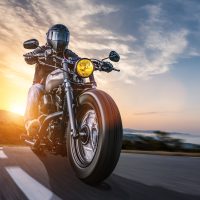Florida’s Motorcycle Laws: What You Need To Know

Motorcycles are especially popular in Florida because there is no “off-season”. Bikers can enjoy year-round riding, unlike their counterparts to the north. And although it may seem like motorcycle laws in Florida sometimes don’t exist, they do. And they should be closely followed at all times. The Florida Highway Safety and Motor Vehicles (FLSMV) has provided a thorough layout of what is expected of Florida bikers:
Being properly licensed is required by law and is one of the first steps to becoming a safe rider. The motorcycle operator’s manual contains valuable information for both beginner and experienced motorcyclists on techniques to operate a motorcycle safely. If you wish to operate any two or three wheel motorcycle, whose engine size is more than 50 cc, you are required to have a motorcycle endorsement on your driver license or hold a ‘Motorcycle Only’ license. Please note that anyone driving a motorcycle without an endorsement is violating the law.
Most of the Motorcycle Safety Foundation (MSF) courses for beginner to experienced riders in Florida are provided by the Department of Highway Safety and Motor Vehicles (FLHSMV) Florida Rider Training Program (FRTP) authorized Sponsors (course providers). These courses cover strategies and techniques on managing the riding environment and avoiding crashes. In addition, the courses offer on-cycle riding sessions in order to practice these street-riding strategies and crash avoidance skills. Learning these skills is important as crash studies show that rider course graduates have lower injury and fatality rates than untrained riders.
New motorcyclists must take and pass the Basic RiderCourse (BRC) or Basic RiderCourse updated (BRCu) through a FRTP authorized Sponsor before they can have the motorcycle endorsement added to their license, per section 322.12(5)(a), Florida Statutes.
No one under 16 years of age may legally operate or be licensed to operate any of the following two or three-wheel motor vehicles on Florida roads, streets or highways: motorcycles, mopeds, motor-driven cycles, motorized scooters or electric helper-motor bicycles as defined in s. 316.003(2) F.S.
If you are coming from another state (other than Alabama) and your license is endorsed for motorcycle operation, Florida will reciprocate the endorsement and the motorcycle course will not be required. Alabama licenses with a motorcycle endorsement included will be reciprocated only if a Motorcycle Safety Foundation (MSF) Basic Rider Course (BRC) completion card is presented with it.
The Department’s Florida Rider Training Program has a wealth of information on motorcycle safety and proper licensure. To find an authorized Sponsor near you, please click here. Upon completing the Basic RiderCourse (BRC), Basic RiderCourse updated (BRCu), 3-Wheel Basic RiderCourse (3WBRC) or the Sidecar/Trike Education Program (S/TEP) for endorsement, the Sponsor will submit your results electronically to the Department. An endorsement fee is required to get the endorsement added to our license.
Steps to obtain a motorcycle endorsement…
- You must hold at least a valid Class E operator’s driver license.
- Complete the Basic RiderCourse (BRC) or Basic RiderCourse updated (BRCu) motorcycle safety course with an authorized Sponsor.
- After successfully passing the RiderCourse, you must obtain your endorsement within (1) year. If the endorsement has not been obtained during the one (1) year grace period, the course completion card as well as the “PASS” waiver status is considered invalid and you must complete another RiderCourse before the endorsement can be added.
- After you complete the Basic RiderCourse (BRC) or Basic RiderCourse updated (BRCu), visit a driver license office or tax collector office that issues driver licenses and inform them that you completed the course. Upon providing proper ID and paying the required endorsement fees, your Class E license will be issued with a motorcycle endorsement.
To obtain a “Motorcycle Only” driver license you must…
- Be at least 16 years old, and if under 18, hold at least a Learner’s License for one year with no traffic convictions.
- Pass the same knowledge test as for a regular Class E operator’s driver license.
- You must complete the Basic RiderCourse (BRC) or the Basic RiderCourse updated (BRCu) with an authorized Sponsor
- After you complete the Basic RiderCourse (BRC) or the Basic RiderCourse updated (BRCu), visit a driver license office or tax collector office that issues licenses and inform them that you completed the required course. Upon providing proper ID and paying the required endorsement fees your “Motorcycle Only” license will be issued.
- Your license will be restricted to operating “Motorcycles Only.”



